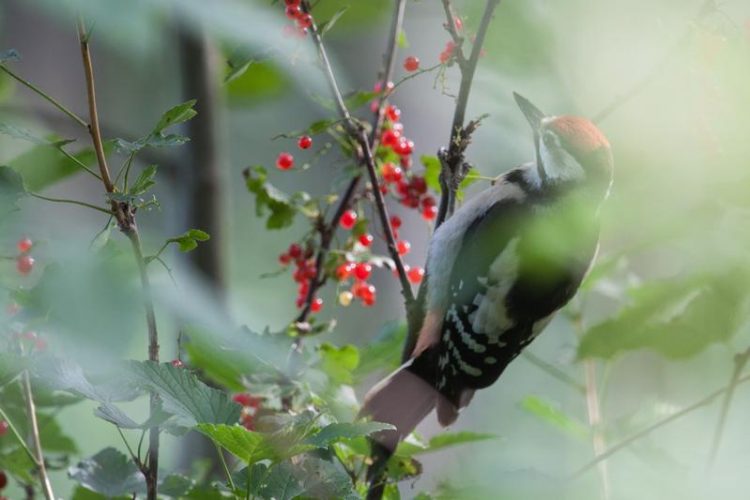Fatal connection

A woodpecker is feeding on the fruit of the Red currant (Ribes spicatum). By defecating the plant seeds elsewhere, the bird contributes to their dispersal. (Photo: University of Marburg / Jörg Albrecht)
“Many plants rely on pollination of their flowers by insects and also need birds or mammals that disperse the plant seeds”, first author Jörg Albrecht explains. “In this case, pollinators and seed dispersers indirectly benefit each other because they increase the reproductive success and dispersal capacity of the shared food plants.”
So far, most studies focus exclusively on a single type of interaction: e.g., on the relationship between predator and prey, or on the interaction of plants with their pollinators. But, as the authors point out, “the same species are often involved in multiple processes.”
Scientists led by Associate Professor Dr. Nina Farwig and Professor Dr. Roland Brandl of the University of Marburg wanted to know whether the destruction of habitats acts in the same way on multiple interaction networks.
The researchers found strong evidence for coupled responses of pollinators and seed dispersers to logging: “Our findings signal an alarm,” the authors write, “as they predict that the conversion of primary old-growth forest ecosystems to secondary habitats may involve a parallel loss of multiple animal-mediated ecosystem services.”
Dr. Nina Farwig holds the Robert Bosch Junior Professorship for “Sustainable Use of Natural Resources” at the University of Marburg. The current study was part of the doctoral thesis of Jörg Albrecht in the “Conservation Ecology” group under the supervision of Nina Farwig.
The project was funded as part of a doctoral fellowship from the German Federal Environmental Foundation to Jörg Albrecht and by funds from the Robert Bosch Foundation to Nina Farwig. Co-author Professor Dr. Roland Brandl is head of the “Department of Ecology – Animal ecology” group at the University of Marburg.
Original publication: Jörg Albrecht & al.: Correlated loss of ecosystem services in coupled mutualistic networks, Nature Communications, 2014, DOI: 10.1038/ncomms4810
For more information:
Contact:
Jörg Albrecht, MSc.
Arbeitsgruppe Naturschutzökologie
Tel.: 06421 28-25385
E-Mail: joerg.albrecht@staff.uni-marburg.de
Juniorprofessorin Dr. Nina Farwig,
Arbeitsgruppe Naturschutzökologie
Tel.: 06421 28-23478
E-Mail: farwig@staff.uni-marburg.de
Homepage: http://www.uni-marburg.de/fb17/fachgebiete/oekologie/conserv_ecol
Media Contact
All latest news from the category: Life Sciences and Chemistry
Articles and reports from the Life Sciences and chemistry area deal with applied and basic research into modern biology, chemistry and human medicine.
Valuable information can be found on a range of life sciences fields including bacteriology, biochemistry, bionics, bioinformatics, biophysics, biotechnology, genetics, geobotany, human biology, marine biology, microbiology, molecular biology, cellular biology, zoology, bioinorganic chemistry, microchemistry and environmental chemistry.
Newest articles

Sea slugs inspire highly stretchable biomedical sensor
USC Viterbi School of Engineering researcher Hangbo Zhao presents findings on highly stretchable and customizable microneedles for application in fields including neuroscience, tissue engineering, and wearable bioelectronics. The revolution in…

Twisting and binding matter waves with photons in a cavity
Precisely measuring the energy states of individual atoms has been a historical challenge for physicists due to atomic recoil. When an atom interacts with a photon, the atom “recoils” in…

Nanotubes, nanoparticles, and antibodies detect tiny amounts of fentanyl
New sensor is six orders of magnitude more sensitive than the next best thing. A research team at Pitt led by Alexander Star, a chemistry professor in the Kenneth P. Dietrich…





















